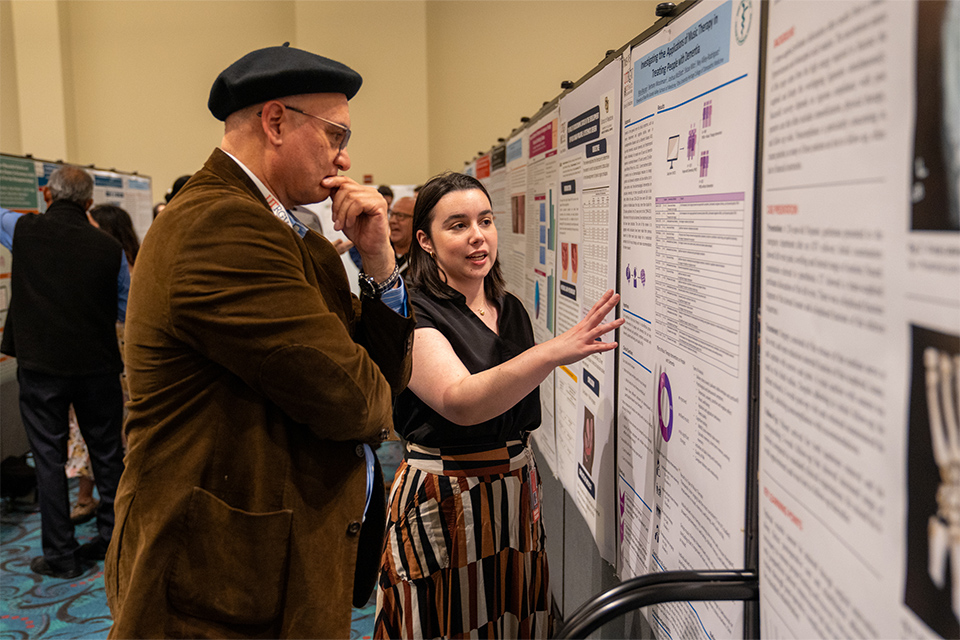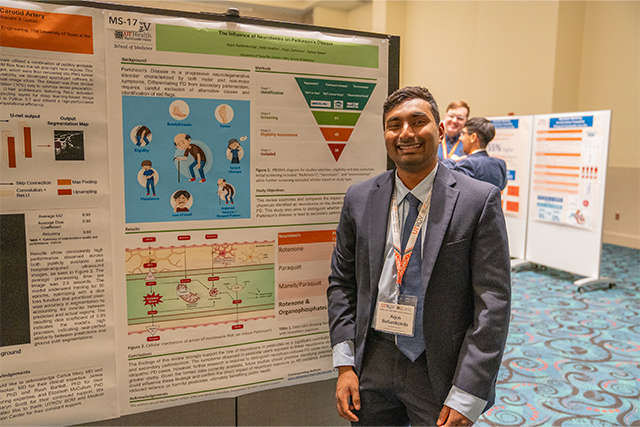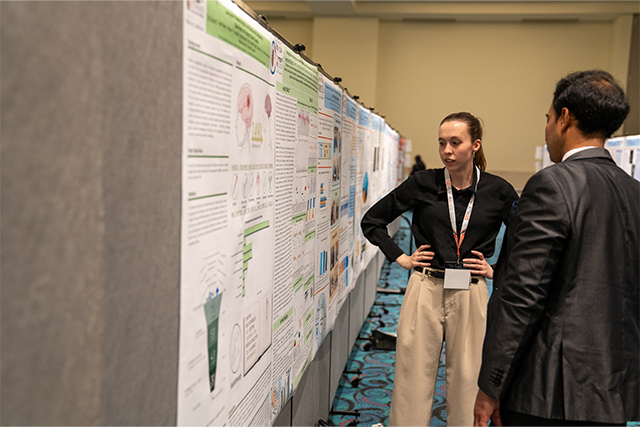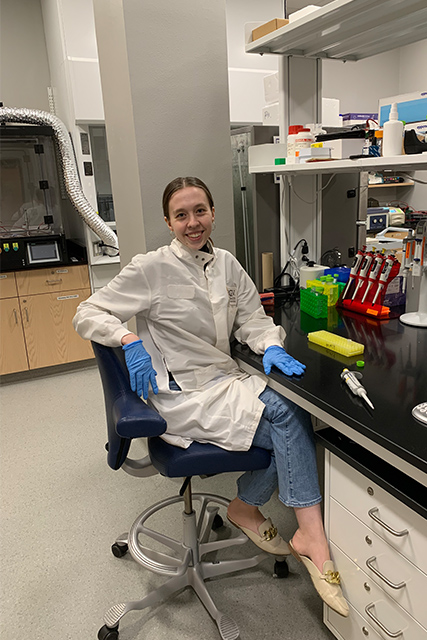By Heriberto Perez–Zuñiga
RIO GRANDE VALLEY, TEXAS – JUNE 26, 2025 – Every summer, a new cohort of medical students from the UTRGV School of Medicine venture into research labs and clinical programs across the country, driven by curiosity, compassion and a shared commitment to making a difference.
Through competitive summer research programs supported by the UTRGV School of Medicine, rising second-year medical explore a range of topics that directly impact South Texas communities, including diabetes, obesity and neurological disorders, while gaining firsthand experience alongside national experts in medicine and science.
The initiative is guided by faculty like Dr. Kelsey Baker, assistant dean of Pre-Clerkships at the UTRGV School of Medicine, who helps students navigate the early stages of their medical education and encourages them to pursue careers in clinical research.
“Students often walk into my office saying, ‘I’ve never done research before,’” Baker said. “What matters is their willingness to try. Their curiosity and drive to serve the Valley are what carry them forward.”
VALLEY CONNECTION
For Arjun Bellamkonda, a rising second-year medical student at the UTRGV School of Medicine from Austin, TX, this summer is about more than lab work.
At Vanderbilt University Medical Center in Nashville, Tenn., he works with Dr. Arrojo e Drigo, assistant professor of Molecular Physiology and Biophysics, to study the biology of aging and metabolic disease, focusing on how diabetes affects long-lived cells and tissues.
This research aims to understand how certain protein complexes maintain their function over time and how that resilience can be harnessed to achieve better health outcomes.
The subject matter hits close to home for Bellamkonda, who has seen firsthand how Type 2 Diabetes impacts everyday life in the Rio Grande Valley.
“Patients living with diabetes navigate daily challenges that many people take for granted,” Bellamkonda said. “Even something as simple as a brisk walk can require careful planning. That reality inspired me to learn more and find ways to help make life easier for patients in our community.”
This work builds on Bellamkonda’s research at UTRGV, conducted with Dr. Xiaoqian Fang, associate professor of Neurology, where he studies brain tissue purification.
Each experience is shaping the toolkit for the kind of physician-scientist he aspires to be – someone comfortable in both the lab and the clinic.
“I want to bridge basic science with clinical care,” he said. “That’s where I feel I can make the most impact.”
TRACING SYMPTOMS, CHANGING TIMELINES
Nina Mourão, a rising second-year medical student at the UTRGV School of Medicine from Austin, TX, is spending the summer in Charlottesville, Virginia, participating in the National Multiple Sclerosis Society’s Clinical Mentorship Program at the University of Virginia Health.
Under the guidance of Dr. Robert Shin, director of the Multiple Sclerosis and Clinical Neuroimmunology Division, she studies all aspects of Multiple Sclerosis (MS), including early warning signs, diagnostic criteria and long-term care.
“The earlier we catch MS, the better the outcomes,” Mourão said. “But that can only happen if we train ourselves to listen closely to patients and understand what to look for.”
Her interest in neurology goes back nearly a decade, fueled by her fascination with how the brain influences human behavior and disease. She enjoys the investigative nature of neurology and the ability to trace symptoms back to specific brain regions.
“It’s like solving a complex puzzle,” she said. “Every piece of information matters; every detail can reveal a deeper pattern.”
The program also emphasizes health equity and social determinants of care, aligning with her goals as a future physician.
“I want to be someone who sees the whole patient including their biology, their story and the structural barriers that affect their access to care,” she said.
UNDERSTANDING METABOLISM & OBESITY
In Boston, Mass., Veronica O’Brien, rising second-year medical student UTRGV School of Medicine from Lubbock, TX, is interning at Beth Israel Deaconess Medical Center at Harvard through the National Institute of Diabetes and Digestive and Kidney Diseases.
Her research focuses on the molecular evolution of carnitine synthesis and the broader mechanisms of energy metabolism.
“This is the kind of work that helps us understand why certain therapies work for some people and not others,” O’Brien said. “It’s about going deeper and looking at what is happening at the cellular level.”
O’Brien’s interest in medicine stems from her parents; her father is a nurse and her mother is a clinical laboratory scientist. However, her experience working nights as an ER technician during the COVID-19 pandemic solidified her decision to pursue medicine.
Now at Harvard, she’s learning techniques like genetic editing and proteomics to understand why some people respond differently to therapy. She hopes to apply this knowledge to obesity research in South Texas.
“Obesity is a major issue in the Valley,” she said. “If we can bring these techniques home, we can study them with the kind of precision that leads to better treatments.”
INVESTING IN THE FUTURE
For Dr. Kelsey Baker, supporting students like Bellamkonda, Mourão, and O’Brien is one of the most rewarding aspects of her job.
“I love seeing our students step into these spaces, ask big questions and come back with new skills and perspectives,” she said.
Dr. Everardo Cobos, interim dean of the UTRGV School of Medicine and chair of the Department of Medicine and Oncology, said that programs like these are essential for cultivating future physicians who are not only skilled but also deeply rooted in the region's needs.
“These students are examples of what’s possible when you combine talent, mentorship and opportunity,” he said. “They’re exploring some of the most pressing challenges in medicine today and bringing that knowledge back to the Valley. That’s how we build a healthier future.”
ABOUT UTRGV
The University of Texas Rio Grande Valley (UTRGV) was created by the Texas Legislature in 2013 as the first major public university of the 21st century in Texas. This transformative initiative provided the opportunity to expand educational opportunities in the Rio Grande Valley, including a new School of Medicine and a School of Podiatry, and made it possible for residents of the region to benefit from the Permanent University Fund – a public endowment contributing support to the University of Texas System and other institutions.
UTRGV has campuses and off-campus research and teaching sites throughout the Rio Grande Valley including Brownsville (formerly The University of Texas at Brownsville campus), Edinburg (formerly The University of Texas-Pan American campus), Harlingen, Weslaco, McAllen, Port Isabel, Rio Grande City and South Padre Island. UTRGV, a comprehensive academic institution, enrolled its first class in the fall of 2015; the School of Medicine welcomed its first class in the summer of 2016, and the School of Podiatric Medicine in the fall of 2022.




